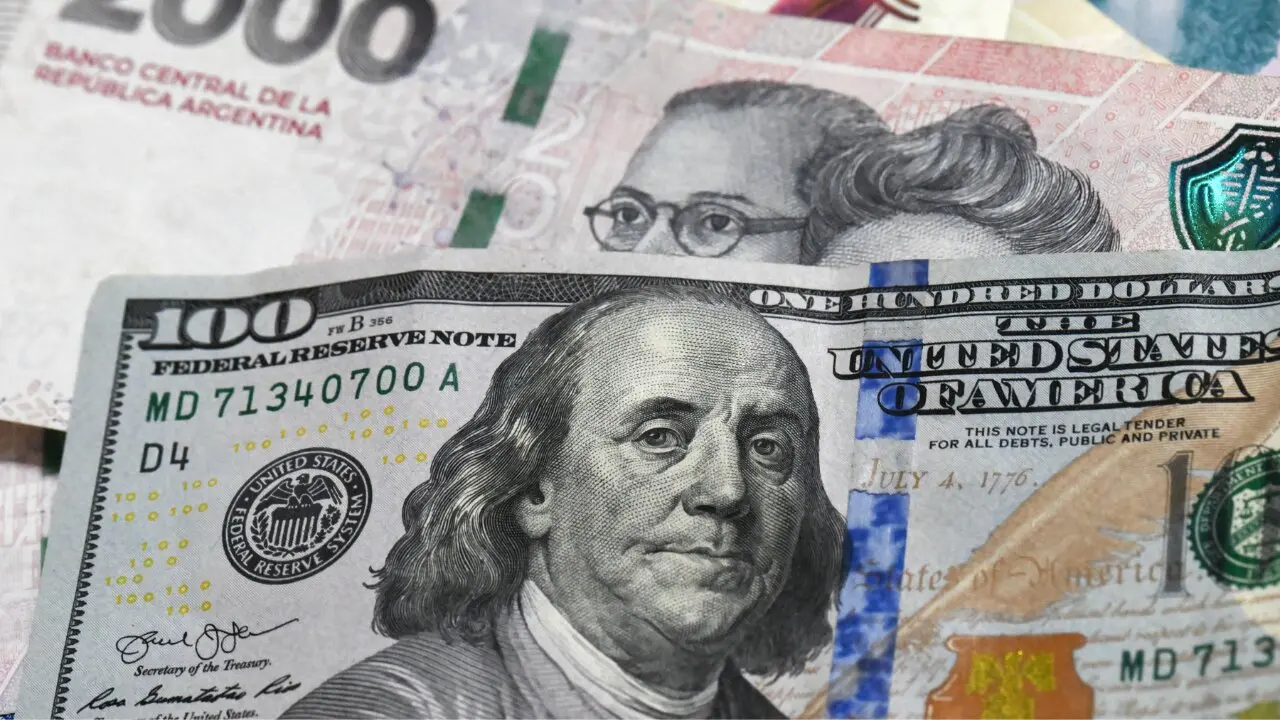Argentina’s government, under President Javier Milei, has officially launched a new managed floating exchange rate regime, ending nearly 14 years of strict currency controls. On the first day of implementation, the retail dollar closed at approximately 1,230 pesos, marking a 12% devaluation compared to last Friday’s close.
What Is the Managed Floating Exchange Rate?
Under the new framework, the official exchange rate for the U.S. dollar will float between 1,000 and 1,400 pesos, with monthly adjustments of 1%. This change introduces a more flexible approach to the foreign exchange market and seeks to restore transparency and stability to Argentina’s economy.
Markets had been anticipating the first official dollar price under the new system. On Friday, April 11, the dollar had closed at 1,097 pesos.
Positive Reaction from Financial Markets
The announcement was met with broad optimism from investors. Argentine bonds and stocks surged on Wall Street, with the Merval Index climbing 4.5%. Despite the positive reaction, high demand for foreign currency led to temporary crashes on several banking websites.
Regulatory Changes from the CNV
In parallel with the exchange regime shift, the National Securities Commission (CNV) eliminated the 24-hour holding period for individuals trading dollar-linked bonds in the MEP market. Previously, investors were required to hold peso-denominated bonds for at least one business day before selling them for dollars.
Faster and Easier Access for Individuals
With this restriction removed, individual investors now benefit from faster, simpler financial operations, enhancing market participation and liquidity.
Official Support from Argentine Authorities
Roberto Silva, President of the CNV, publicly supported the government’s economic direction:
“We are proud to accompany President Javier Milei, Minister Luis Caputo, and the economic teams in implementing Phase 3 of Argentina’s economic program.”
Silva also noted that the CNV has been actively working to remove regulatory obstacles, in line with the Milei administration’s market liberalization strategy.
How the Dollar Bands Will Evolve
Federico Furiase, board member of the Central Bank, explained in a radio interview that the new exchange system will minimize risks associated with the removal of the currency restrictions or “cepo.”
- The lower band, starting at 1,000 pesos, will decrease 1% monthly, aiming to reach 888.36 pesos in one year.
- The upper band will increase 1% monthly, expanding the range within which the dollar can float.
The Central Bank will intervene discretionally within this band to prevent excessive volatility.
“Liberation Day” and the IMF Deal
Argentine financial firm Max Capital referred to the announcement as “Liberation Day”, drawing a parallel to former U.S. President Donald Trump’s 2018 tariff strategy.
In a report signed by Alejo Costa, Head of Economics Research & Strategy, Max Capital emphasized the importance of fiscal discipline as the central anchor of the new IMF-backed economic program. The reforms are part of a transition toward a fully open capital account.
Currency Controls Lifted for Individuals and Corporate Flows
The new measures lift currency restrictions for:
- Individual citizens
- Corporate financial flows
However, corporate stock holdings are still subject to restrictions. These entities will be offered a new government bond called BOPREAL.
Elimination of “Blend” Scheme for Exporters
The updated system also ends the “blend” exchange scheme previously used by exporters, and includes flows that used to go through the Contado con Liquidación (CCL) route. Individuals will now be able to purchase dollars directly in the official market.
U.S. Treasury Secretary Visits Argentina
In a show of international support, U.S. Treasury Secretary Scott Bessent visited Argentina to meet with President Milei. Bessent was accompanied by U.S. business leaders, signaling potential investment interest and strategic alignment amid ongoing U.S. trade negotiations.
Economic Distortions and the Role of Private Capital
Currency controls in Argentina have long been blamed for stifling investment and creating macroeconomic distortions.
ARCAP’s Support for Market Unification
The Argentine Association of Private, Entrepreneurial and Seed Capital (ARCAP) issued a statement supporting the currency market unification:
“This measure is a significant step toward economic normalization, promoting a more predictable and stable business environment—key conditions for investment and productive development.”
ARCAP emphasized the role of private capital in driving Argentina’s economic growth, innovation, and job creation under favorable conditions.

